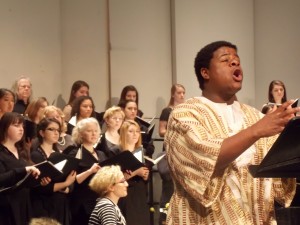Premier of “Paradiso”
My thanks to Gerry Floriano and the Spectrum Women’s Choir, Gwendolyn Gassler and the Concentus Women’s Choir, baritone soloist Jon Turner and drummers Jon Canning, Ted Canning and Yahaya Alhassan for a wonderful premier of the new Dante piece!
Earlier in the concert, the two choirs performed a setting of an excerpt from Dante’s “Paradiso” by Giuseppe Verdi. Verdi had good reason to choose Dante’s poetry in 19th century Italy. The “Risorgimenti” were trying to unite the competing countries of the Italian peninsula after centuries of violence. Verdi was seen as the artistic icon for this movement. Though Dante lived 500 years earlier, his version of the Italian language became the model for a national dialect. Furthermore, Dante argued for a united Italy in the 14th century. Dante became the literary and political “poster-child” for the Italian unification movement.
While Italy was trying to form a new country in the mid 1800’s, we were trying to keep the USA from tearing apart. Tensions over slavery not only divided states but also families. Ultimately, slavery could not persist in a country that granted freedom and liberty for all. 19th century abolitionists also took inspiration from Dante. The Exodus story of songs like “Go Down Moses” also resonates throughout Dante’s poetry. From slave poets who wrote odes to Dante to contemporary African American authors like Toni Morrison, Dante’s journey from spiritual slavery to freedom has found a home in the American literary imagination.
New scholarship by Dr. Dennis Looney and others has shown that the Risorgimenti and the abolitionists were talking to each other, encouraging each other in their respective struggles and both drawing inspiration from a common literary source-Dante’s Commedia.
This new musical work is an artistic response to Dante’s reception among American abolitionists. We pick up the story late in Dante the pilgrim’s journey. He has traveled through Inferno and Purgatorio and after being guided through most of Paradiso by his former love, Beatrice, he comes upon the celestial rose. He says that even as a poet, he did not have words to describe the beauty of this golden rose in which each petal was a saint. Prior to her departure, Beatrice gives Dante a stern talk about what needs to happen in his beloved Italy to make things right. Among other news, she says that Pope Boniface VIII will surely be “thrust deeper down” in Inferno for his abuse of the papal office.
In the opening solo, Dante’s words are placed in American Gospel style. The arrangement of melodic material follows Dante’s “terza rima” rhyme scheme. He arranges his poem in groups of three lines (called tercets) in which the first and third lines rhyme. The second line subsequently provides the rhyme for the first line of the next tercet. This creates an interlocking rhyme scheme that continues throughout the whole poem. I apply melodic fragments that mimic terza rima in this solo.
The women’s choir and West African drums present the celestial rose. Just as Dante’s poetic imagery often takes him back to the roots of his spiritual journey, this setting places the rose within a musical framework that goes back to West Africa. The overlapping vocal lines and interlocking drum patterns paint a musical picture of the beautiful rose of heaven.
The piece pivots from Italian to English as Beatrice gives her farewell speech. Dante shattered the literary expectation of writing in Latin by shifting to his vernacular Italian. The shift to English in this new musical work mimics Dante’s strategy. This speech is not a sentimental, romantic goodbye, but rather a powerful statement of hard truths that Dante needs to hear. Therefore, the first soprano section presents the voice of Beatrice with a driving rhythmic ostinato underneath.
This is not the end of a new musical work, but rather a beginning of something much bigger. I learned a great deal from this experiment. I look forward to expanding this artistic concept to the rest of Dante’s poem for both the concert stage and the theater.
~Glenn

